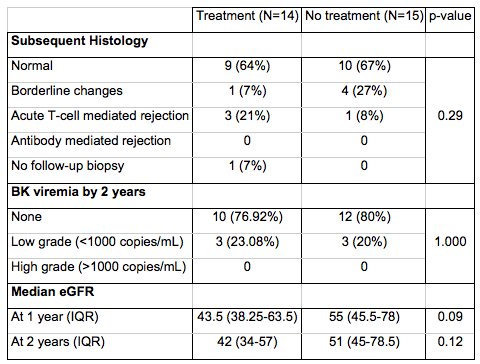Short Term Renal Allograft Outcomes Following Treatment of Early Subclinical Borderline Changes on Surveillance Biopsies.
University of Michigan, Ann Arbor, MI
Meeting: 2017 American Transplant Congress
Abstract number: B139
Keywords: Kidney, Kidney transplantation, Protocol biopsy, Rejection
Session Information
Session Name: Poster Session B: Kidney Complications II
Session Type: Poster Session
Date: Sunday, April 30, 2017
Session Time: 6:00pm-7:00pm
 Presentation Time: 6:00pm-7:00pm
Presentation Time: 6:00pm-7:00pm
Location: Hall D1
There is no consensus on treating subclinical borderline changes on surveillance biopsy in kidney transplant (KT) recipients. We examined whether treatment with pulsed corticosteroids led to differential allograft outcomes.
Methods: This is a single-center retrospective review of 169 consecutive adult KT-alone recipients with biopsies done per indication and per protocol at 3, 6, and 12 months. Recipients with graft failure, rejection requiring treatment, BK viremia (>1000 copies/mL), or donor specific antibody prior to or at time of case identification were excluded. 29 patients with subclinical borderline changes on either 3 or 6-month surveillance biopsy were selected and grouped by treatment (3 daily 250 mg IV methylprednisolone or oral equivalent) vs no treatment per clinician discretion. Outcomes examined included subsequent histology on indication or 1-yr protocol biopsy, new BK viremia by 2 yrs, and estimated GFR by MDRD equation at 1 and 2 yrs post-KT.
Results: There were no statistically significant differences in demographics, immunological risk profile, or immunosuppression between the two groups, although there was a numerically higher proportion of African American, high PRA patients in the treated group (Table 1). There was one loss to follow-up in the treated group, but no death or graft loss was observed in either group by 2 yrs post-KT. There were no significant differences in subsequent histology, BK viremia, or 1 and 2-yr eGFR between the two groups (Table 2).
 Conclusion: There was no difference in outcomes between patients treated for subclinical borderline changes on 3 or 6-month surveillance biopsy and those not treated. Treatment also did not increase risk of BK viremia. Future prospective randomized studies could be conducted on a larger cohort.
Conclusion: There was no difference in outcomes between patients treated for subclinical borderline changes on 3 or 6-month surveillance biopsy and those not treated. Treatment also did not increase risk of BK viremia. Future prospective randomized studies could be conducted on a larger cohort.
CITATION INFORMATION: James C, Woodside K, Park J, Naik A, Farkash E, Sung R, Samaniego M, Huang Y. Short Term Renal Allograft Outcomes Following Treatment of Early Subclinical Borderline Changes on Surveillance Biopsies. Am J Transplant. 2017;17 (suppl 3).
To cite this abstract in AMA style:
James C, Woodside K, Park J, Naik A, Farkash E, Sung R, Samaniego M, Huang Y. Short Term Renal Allograft Outcomes Following Treatment of Early Subclinical Borderline Changes on Surveillance Biopsies. [abstract]. Am J Transplant. 2017; 17 (suppl 3). https://atcmeetingabstracts.com/abstract/short-term-renal-allograft-outcomes-following-treatment-of-early-subclinical-borderline-changes-on-surveillance-biopsies/. Accessed February 16, 2026.« Back to 2017 American Transplant Congress
